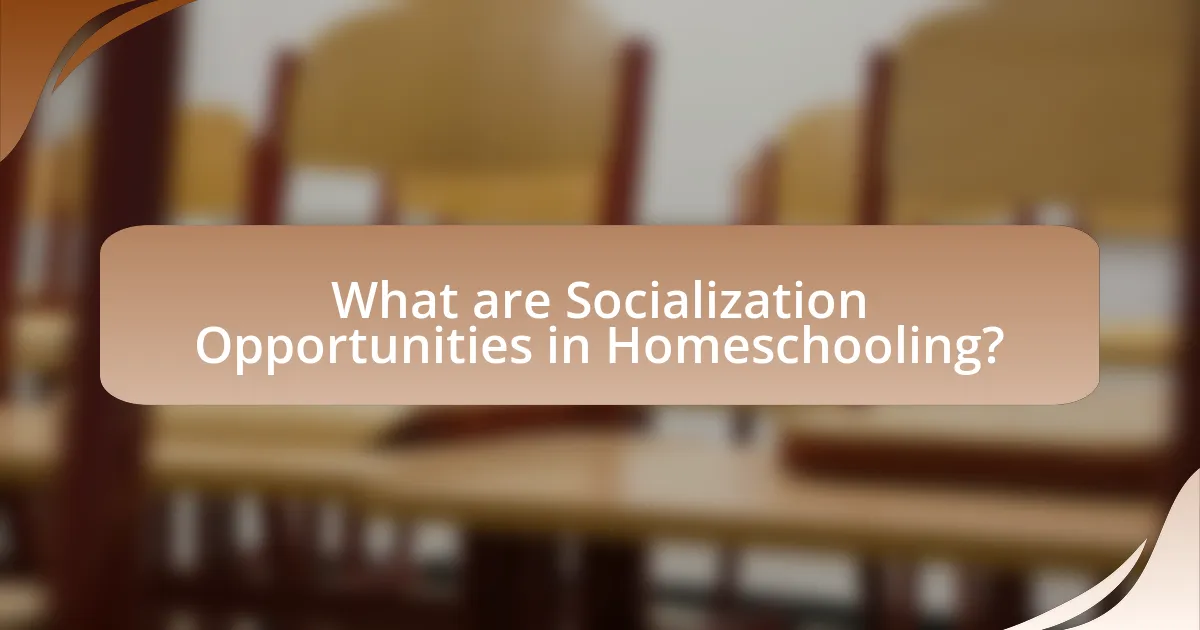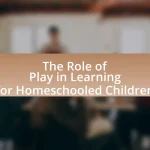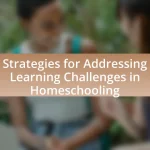The article focuses on incorporating socialization opportunities into homeschooling curricula, emphasizing the importance of peer interaction for children’s development. It outlines various socialization avenues available to homeschoolers, such as co-ops, extracurricular activities, community service, and online platforms, which facilitate essential social skills and emotional growth. The article also addresses challenges homeschoolers face regarding socialization, misconceptions about their social skills, and strategies for parents to create effective socialization experiences. Additionally, it provides guidance on evaluating socialization programs and integrating group activities into daily routines, highlighting the role of community engagement in fostering well-rounded individuals.

What are Socialization Opportunities in Homeschooling?
Socialization opportunities in homeschooling include participation in co-ops, extracurricular activities, community service, and social groups. These avenues allow homeschooled children to interact with peers, develop social skills, and engage in collaborative learning experiences. Research indicates that homeschooled children often participate in organized sports, arts programs, and local clubs, which provide essential social interactions. For instance, a study by the National Center for Education Statistics found that 85% of homeschooled students engage in community activities, highlighting the effectiveness of these socialization opportunities in fostering interpersonal skills.
How can socialization enhance the homeschooling experience?
Socialization enhances the homeschooling experience by providing children with essential interpersonal skills and emotional development. Engaging with peers through group activities, co-ops, or community events allows homeschooled children to practice communication, teamwork, and conflict resolution, which are critical for their future social interactions. Research indicates that children who participate in social activities exhibit improved self-esteem and adaptability, as noted in a study by the National Home Education Research Institute, which found that homeschooled students often outperform their peers in social skills assessments. Thus, incorporating socialization opportunities into a homeschooling curriculum not only enriches the educational experience but also fosters well-rounded personal growth.
What types of socialization opportunities are available for homeschoolers?
Homeschoolers have access to various socialization opportunities, including co-ops, extracurricular activities, community events, and online platforms. Homeschool co-ops allow families to collaborate on educational activities, fostering peer interaction. Extracurricular activities, such as sports teams, music classes, and art workshops, provide additional avenues for social engagement. Community events, like fairs and volunteer opportunities, enable homeschoolers to connect with peers outside their immediate circle. Online platforms, including virtual classes and forums, also facilitate social interaction among homeschoolers, allowing them to share experiences and collaborate on projects. These diverse opportunities ensure that homeschoolers can develop social skills and build friendships.
Why is socialization important for children’s development?
Socialization is crucial for children’s development because it fosters essential social skills and emotional intelligence. Through interactions with peers and adults, children learn to communicate effectively, develop empathy, and understand social norms. Research indicates that children who engage in regular socialization exhibit better academic performance and emotional well-being. For instance, a study published in the Journal of Child Psychology and Psychiatry found that social skills significantly correlate with positive outcomes in both academic and personal domains. Thus, socialization plays a vital role in shaping well-rounded individuals capable of navigating complex social environments.
What challenges do homeschoolers face regarding socialization?
Homeschoolers face significant challenges regarding socialization, primarily due to limited interaction with peers. This isolation can lead to difficulties in developing social skills, as regular school environments provide structured opportunities for children to engage with others, navigate social dynamics, and build friendships. Research indicates that homeschooled children may have fewer chances to participate in group activities, which can hinder their ability to form connections and understand social cues. For instance, a study published in the Journal of School Choice found that homeschooled students often report feeling less socially integrated compared to their traditionally schooled counterparts.
How can parents overcome common socialization barriers?
Parents can overcome common socialization barriers by actively seeking and creating opportunities for their children to interact with peers. Engaging in community activities, such as sports teams, clubs, or local events, allows children to meet others outside their immediate family and homeschool environment. Research indicates that children who participate in group activities develop better social skills and emotional intelligence, which are crucial for effective communication and relationship-building. Additionally, forming co-op groups with other homeschooling families can provide structured socialization experiences, enabling children to collaborate on projects and share learning experiences, thus enhancing their social development.
What misconceptions exist about socialization in homeschooling?
A common misconception about socialization in homeschooling is that homeschooled children lack social skills and opportunities to interact with peers. This belief is inaccurate, as many homeschooling families actively seek out socialization opportunities through co-ops, extracurricular activities, and community events. Research indicates that homeschooled children often engage in diverse social settings, leading to well-rounded social development. For instance, a study by the National Center for Education Statistics found that homeschooled students participate in various group activities, which can enhance their social skills and peer relationships.

How to Identify Suitable Socialization Opportunities?
To identify suitable socialization opportunities, evaluate local community resources such as libraries, parks, and community centers that offer group activities for children. These venues often host events like book clubs, sports leagues, or art classes, which provide structured environments for interaction. Research indicates that children benefit from diverse social experiences; for instance, a study published in the Journal of Educational Psychology found that peer interactions enhance social skills and emotional development. Additionally, online platforms and homeschooling networks can connect families for group outings or cooperative learning, further expanding socialization options.
What factors should be considered when choosing socialization activities?
When choosing socialization activities, consider the age and developmental stage of the participants, as these factors influence engagement and interaction levels. Activities should align with the interests and preferences of the individuals involved to enhance participation and enjoyment. Additionally, the social environment’s safety and inclusivity are crucial, as they affect comfort and willingness to engage. Accessibility of the activity location and resources also plays a significant role, ensuring that all participants can join without barriers. Lastly, the potential for skill development and learning outcomes should be evaluated, as effective socialization activities can foster communication, teamwork, and problem-solving skills.
How do age and interests influence socialization choices?
Age and interests significantly influence socialization choices by determining the types of activities and interactions individuals seek. Younger individuals, such as children and teenagers, often gravitate towards group activities that promote play and shared experiences, such as sports or clubs, which foster peer relationships. In contrast, adults may prefer socialization through interest-based gatherings, such as book clubs or professional networks, reflecting their established interests and life stages. Research indicates that socialization preferences evolve with age; for instance, a study published in the Journal of Youth and Adolescence found that adolescents prioritize peer acceptance and group activities, while adults focus on deeper, interest-aligned connections. This shift underscores how age and interests shape the social environments individuals choose to engage in.
What role does location play in finding socialization opportunities?
Location significantly influences the availability of socialization opportunities. Proximity to community centers, parks, and educational institutions often determines the frequency and variety of social interactions available to individuals. For instance, urban areas typically offer more organized activities, such as clubs and classes, which facilitate social engagement compared to rural settings where such options may be limited. Research indicates that children in densely populated areas have access to more extracurricular activities, enhancing their social skills and peer interactions. Therefore, the geographical context directly impacts the extent and quality of socialization opportunities available to individuals, particularly in a homeschooling environment.
How can parents assess the quality of socialization opportunities?
Parents can assess the quality of socialization opportunities by observing the frequency and diversity of interactions their children have with peers. Regular participation in group activities, such as sports, clubs, or community events, indicates a robust social environment. Research shows that children who engage in varied social settings develop better social skills and emotional intelligence. For instance, a study published in the Journal of Educational Psychology found that children involved in diverse extracurricular activities exhibited higher levels of social competence. Additionally, parents can evaluate the nature of these interactions by considering factors such as the presence of positive role models and the encouragement of cooperative play, which are essential for healthy social development.
What criteria should be used to evaluate socialization programs?
To evaluate socialization programs, criteria should include effectiveness in fostering social skills, participant engagement levels, and the diversity of social interactions provided. Effectiveness can be measured through assessments of communication skills, teamwork, and conflict resolution abilities developed during the program. Engagement levels can be gauged by participant feedback and attendance rates, indicating interest and involvement. Additionally, the diversity of social interactions is crucial, as programs should offer varied opportunities for children to interact with peers from different backgrounds, enhancing their social adaptability. These criteria ensure that socialization programs meet educational and developmental goals effectively.
How can feedback from other homeschooling families guide decisions?
Feedback from other homeschooling families can significantly guide decisions by providing insights into effective socialization strategies and resources. When families share their experiences, they reveal which activities foster social skills and community engagement, such as co-ops, field trips, or group classes. Research indicates that children who participate in group learning environments develop better social competencies, as highlighted in a study by the National Center for Education Statistics, which found that 75% of homeschooled students engage in extracurricular activities that promote social interaction. This data underscores the importance of learning from peers in the homeschooling community to identify successful methods for incorporating socialization into a curriculum.

What Strategies Can Be Used to Incorporate Socialization into the Curriculum?
To incorporate socialization into the curriculum, educators can implement collaborative projects, group discussions, and peer teaching activities. Collaborative projects encourage students to work together towards a common goal, fostering teamwork and communication skills. Group discussions allow students to express their ideas and learn from one another, enhancing their social interaction. Peer teaching activities enable students to take on teaching roles, which not only reinforces their understanding of the material but also builds confidence and social skills. Research indicates that social learning environments significantly improve student engagement and interpersonal skills, supporting the effectiveness of these strategies in educational settings.
How can parents integrate socialization into daily homeschooling routines?
Parents can integrate socialization into daily homeschooling routines by scheduling regular group activities with other homeschooling families. Engaging in co-op classes, where children learn together in subjects like art or science, fosters interaction and collaboration. Additionally, participating in community sports teams or local clubs provides opportunities for children to meet peers outside their immediate family. Research indicates that social interactions are crucial for developing communication skills and emotional intelligence, which are essential for children’s overall development.
What types of group activities can be included in the curriculum?
Group activities that can be included in the curriculum encompass collaborative projects, team sports, group discussions, and cooperative learning exercises. Collaborative projects allow students to work together on assignments, fostering teamwork and communication skills. Team sports promote physical activity and social interaction, while group discussions encourage critical thinking and the exchange of ideas. Cooperative learning exercises, such as peer tutoring or group problem-solving tasks, enhance social skills and academic understanding. These activities are essential for developing interpersonal skills and creating a supportive learning environment.
How can cooperative learning enhance socialization among peers?
Cooperative learning enhances socialization among peers by fostering collaboration and communication skills. In cooperative learning environments, students work together in small groups to achieve common goals, which encourages interaction and the development of interpersonal relationships. Research indicates that this approach not only improves academic performance but also increases social skills, as students learn to negotiate, share responsibilities, and resolve conflicts. For instance, a study by Johnson and Johnson (2009) found that cooperative learning significantly enhances social interaction and promotes a sense of belonging among students, thereby reinforcing the importance of socialization in educational settings.
What role do extracurricular activities play in socialization?
Extracurricular activities play a crucial role in socialization by providing structured environments where individuals can interact, collaborate, and build relationships outside of academic settings. These activities foster teamwork, communication skills, and a sense of belonging, which are essential for developing social competence. Research indicates that participation in extracurricular activities is linked to improved social skills and increased peer relationships, as evidenced by a study published in the Journal of Educational Psychology, which found that students involved in such activities reported higher levels of social engagement and support.
How can sports and clubs provide socialization benefits?
Sports and clubs provide socialization benefits by creating structured environments where individuals can interact, collaborate, and build relationships. Participation in team sports fosters teamwork and communication skills, as players must work together to achieve common goals. Clubs, whether focused on hobbies or academic interests, encourage members to share experiences and ideas, enhancing social bonds. Research indicates that children involved in sports are more likely to develop social skills and form friendships, as evidenced by a study published in the Journal of Sport and Exercise Psychology, which found that youth sports participation significantly correlates with improved social competence.
What are the advantages of community service projects for socialization?
Community service projects provide significant advantages for socialization by fostering interpersonal skills and building community connections. Engaging in these projects allows individuals to interact with diverse groups, enhancing their ability to communicate effectively and empathize with others. Research indicates that participation in community service can lead to improved social skills, as individuals learn to collaborate, resolve conflicts, and develop leadership qualities. For instance, a study published in the Journal of Community Psychology found that youth involved in community service reported higher levels of social competence and a greater sense of belonging within their communities. This evidence underscores the role of community service in promoting socialization and strengthening social networks.
What are some best practices for fostering socialization in homeschooling?
To foster socialization in homeschooling, parents should actively engage their children in group activities and community events. Organizing playdates with other homeschooling families allows children to interact and build friendships. Additionally, enrolling children in extracurricular activities such as sports teams, art classes, or music lessons provides structured environments for social interaction. Participating in local homeschooling co-ops can also enhance social opportunities, as these groups often organize field trips, classes, and social gatherings. Research indicates that children who engage in diverse social settings develop better social skills and emotional intelligence, reinforcing the importance of these practices in a homeschooling context.
How can parents create a balanced schedule that includes socialization?
Parents can create a balanced schedule that includes socialization by intentionally integrating group activities and social events into their homeschooling routine. This can be achieved by setting specific days for co-op classes, playdates, or community events, ensuring that children have regular opportunities to interact with peers. Research indicates that children benefit from social interactions, which enhance their emotional and social development. For instance, a study published in the Journal of Educational Psychology found that social engagement positively correlates with academic success and emotional well-being. By prioritizing these socialization opportunities within their schedule, parents can foster a well-rounded educational experience for their children.
What tips can help parents encourage their children to engage socially?
Parents can encourage their children to engage socially by providing structured opportunities for interaction with peers. Organizing regular playdates, group activities, or community events allows children to practice social skills in a supportive environment. Research indicates that children who participate in group activities develop better communication and teamwork skills, which are essential for socialization. Additionally, involving children in team sports or clubs can foster friendships and enhance their ability to work collaboratively with others.










